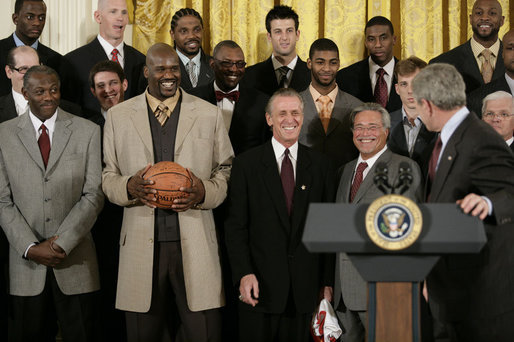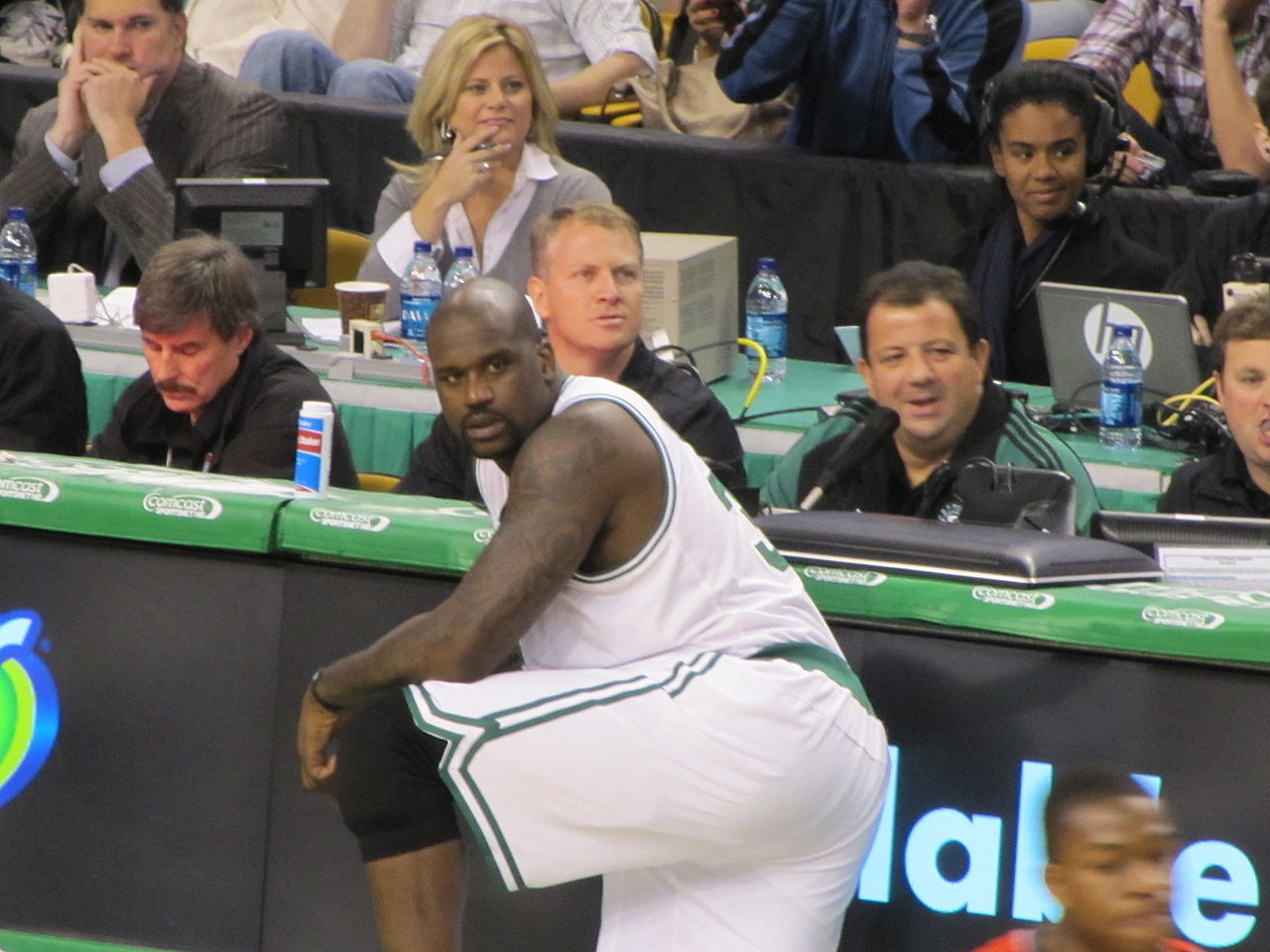Shaquille O'Neal (Part 1)
Shaquille O'Neal (Part 1)

Shaquille O'Neal, commonly known as Shaq, is a retired American professional basketball player renowned for his dominance as a center in the National Basketball Association (NBA). Standing at 7 feet 1 inch tall and weighing 325 pounds, he played for six teams over a remarkable 19-year career.
After a successful college basketball stint with the LSU Tigers, O'Neal was selected as the first overall pick by the Orlando Magic in the 1992 NBA draft. He quickly established himself as one of the premier centers in the league, winning the Rookie of the Year award in the 1992–93 season and leading the Magic to the NBA Finals in 1995.
In 1996, O'Neal signed with the Los Angeles Lakers, where he enjoyed tremendous success, winning three consecutive NBA championships from 2000 to 2002. Despite conflicts with teammate Kobe Bryant, O'Neal's tenure with the Lakers solidified his status as one of the greatest players of his generation.
Following his time with the Lakers, O'Neal played for the Miami Heat, where he captured his fourth NBA championship in 2006. He later had stints with the Phoenix Suns, Cleveland Cavaliers, and Boston Celtics before retiring in 2011.
Throughout his illustrious career, O'Neal amassed numerous accolades, including the NBA Most Valuable Player (MVP) award in 2000, three NBA Finals MVP awards, and 15 All-Star Game selections. He ranks among the top players in NBA history in points scored, field goals, rebounds, and blocks.
Off the court, O'Neal has pursued various ventures, including music, acting, and business. He has released several rap albums, starred in films, and hosted his own reality shows. O'Neal's larger-than-life personality and contributions to the game have solidified his legacy as one of basketball's most iconic figures.
Shaquille O'Neal's early life was marked by challenges and achievements. Born on March 6, 1972, in Newark, New Jersey, he faced adversity from an early age due to his father's struggles with drug addiction. His biological father, Joe Toney, was absent from his life, and O'Neal was raised by his Jamaican stepfather, Phillip Arthur Harrison, a career Army sergeant who played a significant role in his upbringing.
Growing up in a tall family, O'Neal quickly outgrew his peers, reaching 6 feet 6 inches tall by the age of 13. Despite his height, he initially did not show much interest in basketball. However, he found refuge and purpose at the Boys & Girls Clubs of America in Newark, where he honed his basketball skills and stayed away from trouble.
Due to his stepfather's military career, O'Neal's family moved frequently, eventually settling in San Antonio, Texas. It was there that O'Neal attended Robert G. Cole High School, where he emerged as a basketball prodigy. Standing at 6 feet 10 inches tall by age 16, he led his high school team to remarkable success, culminating in a state championship victory during his senior year. O'Neal's dominance on the court earned him comparisons to basketball legend Kareem Abdul-Jabbar, inspiring him to wear Abdul-Jabbar's jersey number, 33.
O'Neal's high school achievements laid the foundation for his future basketball career, propelling him to become one of the most dominant players in NBA history. Despite the challenges he faced in his personal life, O'Neal's determination and talent set him on a path to greatness both on and off the basketball court.
After his successful high school basketball career, Shaquille O'Neal continued his academic and athletic journey at Louisiana State University (LSU). He enrolled in the university's business program while also joining the LSU Tigers basketball team under the guidance of coach Dale Brown. O'Neal had a profound impact on the team, showcasing his exceptional talent and dominating performances on the court.
During his time at LSU, O'Neal's stellar basketball skills earned him numerous accolades and recognition. He was a two-time All-American and two-time Southeastern Conference (SEC) Player of the Year. Additionally, O'Neal received the prestigious Adolph Rupp Trophy as the NCAA men's basketball player of the year in 1991. His remarkable achievements also led to him being named college player of the year by both the Associated Press (AP) and United Press International (UPI).
Despite his early departure from LSU to pursue a career in the NBA, O'Neal remained committed to his education and continued his studies while playing professional basketball. His contributions to LSU's basketball program were duly recognized when he was later inducted into the LSU Hall of Fame.
As a lasting tribute to his legacy, a 900-pound bronze statue of O'Neal stands proudly in front of the LSU Basketball Practice Facility, serving as a symbol of his impact on the university and the sport of basketball as a whole.
After being selected as the first overall pick by the Orlando Magic in the 1992 NBA draft, Shaquille O'Neal embarked on his professional basketball career. Before joining the Magic, he spent time in Los Angeles, where he received mentorship from the legendary Hall of Famer, Magic Johnson, honing his skills and preparing for the challenges of the NBA.
Upon joining the Orlando Magic, O'Neal encountered a jersey number issue as Terry Catledge already wore the number 33 jersey, leading O'Neal to opt for number 32 instead. Despite this initial setback, O'Neal wasted no time in making an impact in the league. He made history by becoming the first player ever to be named Player of the Week in his debut week in the NBA, showcasing his immediate impact and promise as a rising star.
During his rookie season, O'Neal's extraordinary talent and dominance on the court were evident as he averaged impressive statistics of 23.4 points on 56.2% shooting, 13.9 rebounds, and 3.5 blocks per game. These remarkable performances earned him the prestigious title of the 1993 NBA Rookie of the Year, distinguishing him as one of the league's brightest young talents. Additionally, O'Neal achieved the rare feat of being voted as an All-Star starter in his rookie season, a distinction previously achieved only by basketball legend Michael Jordan in 1985.
Despite O'Neal's stellar individual performances, the Orlando Magic finished the season with a 41–41 record, marking a significant improvement of 20 wins compared to the previous season. However, they narrowly missed out on the playoffs due to a tie-breaker with the Indiana Pacers.
Throughout the season, there were murmurs of discontent within the team regarding the coaching staff, with O'Neal reportedly expressing a desire for a change in leadership. Sports Illustrated writer Jack McCallum overheard O'Neal advocating for assistant coach Brian Hill to replace head coach Matty Guokas, reflecting O'Neal's ambitions for the team's future success.
References
- "Shaquille O'Neal | Stats". NBA.com. March 6, 1972. Archived from the original on February 12, 2022. Retrieved February 13, 2022.
- ^ "CBS Sports' 50 greatest NBA players of all time: Where do LeBron, Curry rank?". CBS Sports. February 17, 2017. Archived from the original on December 6, 2018. Retrieved December 18, 2017.
- ^ "All-Time #NBArank: Shaq comes in at No. 9". ESPN. February 9, 2016. Archived from the original on April 6, 2019. Retrieved December 18, 2017.
- ^ "SLAM 500 Greatest NBA Players of All Time | Basketball-Reference.com". Basketball-Reference.com. Archived from the original on May 14, 2019. Retrieved December 18, 2017.
- ^ Bailey, Andy (September 25, 2019). "NBA All-Time Player Rankings: Top 10 Centers". Bleacher Report. Archived from the original on November 11, 2020. Retrieved April 19, 2021.
- ^ Heisler, Mark. "Shaquille O'Neal traded to Cleveland Cavaliers for 3 players, cash". Los Angeles Times. Archived from the original on June 28, 2009. Retrieved May 23, 2010.
- ^ Zillgitt, Jeff (August 5, 2010). "Void filled: 15-time All-Star Shaquille O'Neal to Celtics". USA Today. Archived from the original on June 28, 2011. Retrieved March 15, 2011.
- ^ "NBA at 50: Top 50 Players". NBA.com. Archived from the original on November 14, 2017. Retrieved January 9, 2022.
- a b c "Shaquille O'Neal NBA & ABA Statistics". Basketball-Reference.com. Archived from the original on January 1, 2021. Retrieved August 1, 2011.
- ^ "Naismith Memorial Basketball Hall of Fame Class of 2016 Announcement presented by Haggar Clothing Company". Naismith Memorial Basketball Hall of Fame. April 4, 2016. Archived from the original on April 7, 2016. Retrieved April 4, 2016.
- ^ "Dream Team, Shaq and Kukoc headline 2017 Class of FIBA Hall of Fame Inductees". FIBA.basketball. August 23, 2017. Archived from the original on March 12, 2018. Retrieved August 3, 2021.
- ^ "NBA's 75 Anniversary Team Players". NBA.com. December 25, 2021. Archived from the original on February 17, 2022. Retrieved February 13, 2022.
- ^ Greenburg, Zack (July 31, 2018). "How Shaq Became The Biggest DJ On The Planet". Forbes. Archived from the original on May 22, 2019. Retrieved July 31, 2021.
- ^ "Homepage". The Big Podcast with Shaq. Archived from the original on July 17, 2017. Retrieved July 14, 2017 – via podcastone.com.
- a b "Kings Guard Gaming Names Shaquille O'Neal First General Manager". ThePostGame. April 2, 2018. Archived from the original on June 10, 2019. Retrieved April 4, 2018.








































